- TungumálAfrikaans Argentina AzÉrbaycanca
á¥áá áá£áá Äesky Ãslenska
áá¶áá¶ááááá à¤à¥à¤à¤à¤£à¥ বাà¦à¦²à¦¾
தமிழ௠à²à²¨à³à²¨à²¡ ภาษาà¹à¸à¸¢
ä¸æ (ç¹é«) ä¸æ (é¦æ¸¯) Bahasa Indonesia
Brasil Brezhoneg CatalÃ
ç®ä½ä¸æ Dansk Deutsch
Dhivehi English English
English Español Esperanto
Estonian Finnish Français
Français Gaeilge Galego
Hrvatski Italiano Îλληνικά
íêµì´ LatvieÅ¡u Lëtzebuergesch
Lietuviu Magyar Malay
Nederlands Norwegian nynorsk Norwegian
Polski Português RomânÄ
Slovenšcina Slovensky Srpski
Svenska Türkçe Tiếng Viá»t
Ù¾Ø§Ø±Ø³Û æ¥æ¬èª ÐÑлгаÑÑки
ÐакедонÑки Ðонгол Ð ÑÑÑкий
СÑпÑки УкÑаÑнÑÑка ×¢×ר×ת
اÙعربÙØ© اÙعربÙØ©
Heim / Albúm / Merki Bob Kafka + Jim Parker
+ Jim Parker + George Cooper
+ George Cooper 5
5

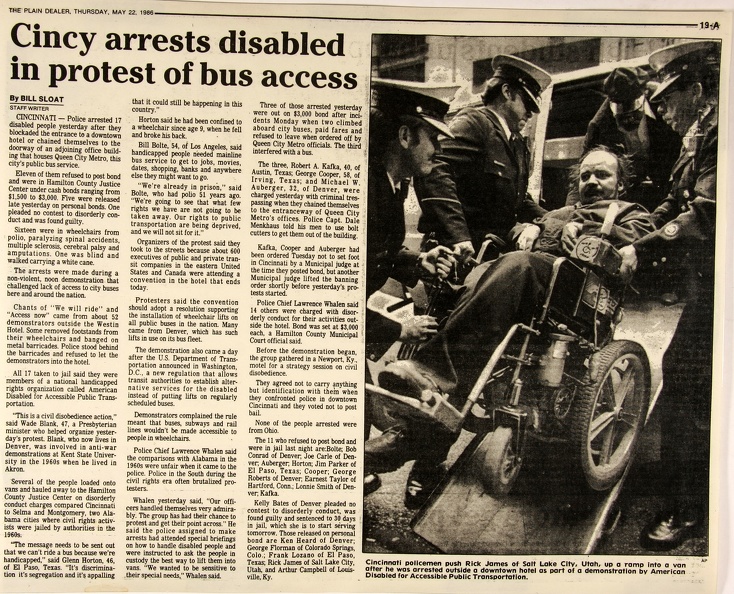 ADAPT (267)
ADAPT (267)
THE PLAIN DEALER, THURSDAY, MAY 22; 1986 page 19-A PHOTO by AP: Four policemen in their fancy police hats are "rolling" a man (Rick James) up a 150 degree (ie. almost vertical) "ramp" into a van. Rick is sitting with his hands up by his chest. His hat is missing and his hair is flying out in all directions. His expression is a mix of amazement, disgust and resignation. Caption reads: Cincinnati policemen push Rick James of Salt Lake City, Utah, up a ramp into a van after he was arrested outside a downtown hotel as part of a demonstration by American Disabled for Accessible Public Transportation. Title: Cincy arrests disabled in protest of bus access By BILL SLOAT STAFF writer CINCINNATI — Police arrested l7 disabled people yesterday after they blockaded the entrance to a downtown hotel or chained themselves to the doorway of an adjoining office building that houses Queen City Metro, this city’s public bus service. Eleven of them refused to post bond and were in Hamilton County Justice Center under cash bonds ranging from $1,500 to $3,000. Five were released late yesterday on personal bonds. One pleaded no contest to disorderly conduct and was found guilty. Sixteen were in wheelchairs from polio, paralyzing spinal accidents, multiple sclerosis, cerebral palsy and amputations. One was blind and walked carrying a white cane. The arrests were made during a non-violent, noon demonstration that challenged lack of access to city buses here and around the nation. Chants of “We will ride" and “Access now” came from about 52 demonstrators outside the Westin Hotel. Some removed footstands from their wheelchairs and banged on metal barricades. Police stood behind the barricades and refused to let the demonstrators into the hotel. All 17 taken to jail said they were members of a national handicapped rights organization called American Disabled for Accessible Public Transportation. “This is a civil disobedience action," said Wade Blank, 47, a Presbyterian minister who helped organize yesterday's protest. Blank, who now lives in Denver, was involved in anti-war demonstrations at Kent State University in the 1960s when he lived in Akron. Several of the people loaded onto vans and hauled away to the Hamilton County Justice Center on disorderly conduct charges compared Cincinnati to Selma and Montgomery, two Alabama cities where civil rights activists were jailed by authorities in the 1960s. “The message needs to be sent out that we can’t ride a bus because we're handicapped,” said Glenn Horton, 46, of El Paso, Texas. "It's discrimination it’s segregation and it’s appalling that it could still be happening in this country." Horton said he had been confined to a wheelchair since age 9, when he fell and broke his back. Bill Bolte, 54, of Los Angeles, said handicapped people needed mainline bus service to get to jobs, movies, dates, shopping, banks and anywhere else they might want to go. “We're already in prison," said Bolte, who had polio 51 years ago. “We're going to see that what few rights we have are not going to be taken away. Our rights to public transportation are being deprived, and we will not sit for it." Organizers of the protest said they took to the streets because about 600 executives of public and private transit companies in the eastern United States and Canada were attending a convention in the hotel that ends today. Protesters said the convention should adopt a resolution supporting the installation of wheelchair lifts on all public buses in the nation. Many came from Denver, which has such lifts in use on its bus fleet. The demonstration also came a day after the U.S. Department of Transportation announced in Washington, D.C., a new regulation that allows transit authorities to establish alternative services for the disabled instead of putting lifts on regularly scheduled buses. Demonstrators complained the rule meant that buses, subways and rail lines wouldn't be made accessible to people in wheelchairs. Police Chief Lawrence Whalen said the comparisons with Alabama in the 1960s were unfair when it came to the police. Police in the South during the civil rights era often brutalized protesters. Whalen yesterday said, “Our officers handled themselves very admirably. The group has had their chance to protest and get their point across." He said the police assigned to make arrests had attended special briefings on how to handle disabled people and were instructed to ask the people in custody the best way to lift them into vans. “We wanted to be sensitive to their special needs." Whalen said. Three of those arrested yesterday were out on $3,000 bond after incidents Monday when two climbed aboard city buses, paid fares and refused to leave when ordered off by Queen City Metro officials. The third interfered with a bus. The three, Robert A. Kafka, 40, of Austin, Texas; George Cooper, 58, of Irving, Texas; and Michael W. Auberger, 32, of Denver, were charged yesterday with Criminal trespassing when they chained themselves to the entranceway of Queen City Metro's offices. Police Capt. Dale Menkhaus told his men to use bolt cutters to get them out of the building. Kafka, Cooper and Auberger had been ordered Tuesday not to set foot in Cincinnati by a Municipal judge at the time they posted bond, but another Municipal judge lifted the banning order shortly before yesterday's protests started. Police Chief Lawrence Whalen said 14 others were charged with disorderly conduct for their activities outside the hotel. Bond was set at $3,000 each, a Hamilton County Municipal Court official said. Before the demonstration began, the group gathered in a Newport, Ky., motel for a strategy session on civil disobedience. They agreed not to carry anything but identification with them when they confronted police in downtown Cincinnati and they voted not to post bail. None of the people arrested were from Ohio. The 11 who refused to post bond and were in jail last night are: Bolte; Bob Conrad of Denver; Joe Carle of Denver; Auberger; Horton; Jim Parker of El Paso, Texas; Cooper; George Roberts of Denver; Earnest Taylor of Hartford, Conn.; Lonnie Smith of Denver; Kafka. Kelly Bates of Denver pleaded no contest to disorderly conduct, was found guilty and sentenced to 30 days in jail, which she is to start serving tomorrow. Those released on personal bond are Ken Heard of Denver; George Florman of Colorado Springs, Colo.; Frank Lozano of El Paso, Texas; Rick James of Salt Lake City, Utah; and Arthur Campbell of Louisville, Ky.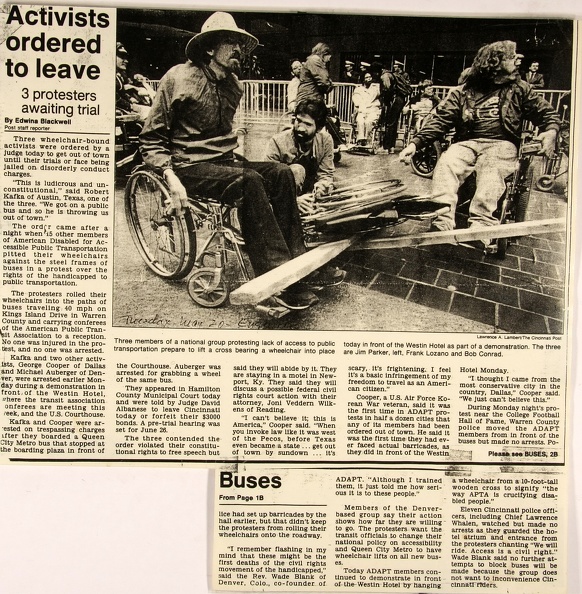 ADAPT (253)
ADAPT (253)
The Cincinnati Post Tuesday May 20 - Photo by Lawrence A. Lambert/The Cincinnati Post: A man (Jim Parker) in a big straw hat and a manual wheelchair sits holding a wooden structure on his feet. Beside him, on his left, a man with dark hair and a dark beard (Frank Lozano) kneels, attaching a folded manual wheelchair to the crossed wood. To his left, another man (Bob Conrad) in a power chair a jacket and an ADAPT shirt, with the access symbol and an equal sign in the wheel, points at what Frank is doing and looks off to his right. Over Bob's right shoulder you can see Bobby Simpson and an African American woman (Gwen Hubbard?) up against some police barriers; the woman is talking with someone. To their right and over Frank's head you can see another man in a wheelchair watching as a woman stands beside him. Over Jim's shoulder you can see another protester in a wheelchair. In the background is the cavernous black of the hotel entrance which is blocked by metal barricades and guarded by police. caption reads: Three members of a national group protesting lack of access to public transportation prepare to lift a cross bearing a wheelchair into place today in from of the Westin Hotel as part of a demonstration. The three are Jim Parker, left, Frank Lozano and Bob Conrad. Title: Activists ordered to leave 3 protesters awaiting trial By Edwin: Blackwell, Post staff reporter Three wheelchair-bound activists were ordered by a judge today to get out of town until their trials or face being jailed on disorderly conduct charges. “This is ludicrous and unconstitutional," said Robert Kafka of Austin, Texas, one of the three. "We got on a public bus and so he is throwing us out of town." The order came after a night when 15 other members or American Disabled for Accessible Public Transportation pitted their wheelchairs against the steel frames of buses in a protest over the rights of the handicapped to public transportation. The protesters rolled their wheelchairs into the paths of buses traveling 40 mph on Kings Island Drive in Warren County and carrying conferees of the American Public Transit Association to a reception. No one was injured in the protest, and no one was arrested. Kafka and two other activists, George Cooper of Dallas and Michael Auberger of Denver, were arrested earlier Monday during a demonstration in front of the Westin Hotel, where the transit association conferees are meeting this week, and the U.S. Courthouse. Kafka and Cooper were arrested on trespassing charges after they boarded a Queen City Metro bus that stopped at the boarding plaza in front of the Courthouse. Auberger was arrested for grabbing a wheel of the same bus. They appeared in Hamilton County Municipal Court today and were told by Judge David Albanese to leave Cincinnati today or forfeit their $3000 bonds. A pre-trial hearing was set for June 26. The three contended the order violated their constitutional rights to free speech but said they will abide by it. They are staying in a motel in Newport, Ky. They said they will discuss possible federal civil rights court action with their attorney, Joni Veddern Wilkens of Reading. "I can’t believe it; this is America," Cooper said. “When you invoke law like it was west of the Pecos, before Texas even became a state . .. get out of town by sundown ... it's scary, it's frightening. I feel it's a basic infringement of my freedom to travel as an American citizen." Cooper, a U.S. Air Force Korean Wax veteran, said it was the first time in ADAPT protests in half a dozen cities that any of its members had been ordered out of town. He said it was the first time they had ever faced actual barricades, as they did in front at the Westin Hotel Monday. “I thought I came from the most conservative city in the country, Dallas," Cooper said. "We just can't believe this." During Monday night's protest near the College Football Hall of Fame, Warren County police moved the ADAPT members from in front of the buses but made no arrests. Police had set up barricades by the hall earlier, but that didn't keep the protesters from roiling their wheelchairs onto the roadway. “I remember flashing in my mind that these might be the first deaths of the civil rights movement of the handicapped," said the Rev. Wade Blank of Denver, Colo., co-founder of ADAPT. “Although I trained them, it just told me how serious it is to these people." Members of the Denver based group say their action shows how far they are willing to go. The protesters want the transit officials to change their national policy on accessibility and Queen City Metro to have wheelchair lifts on all new buses. Today ADAPT members continued to demonstrate in front of the Westin Hotel by hanging a wheelchair from a 10-foot-tall wooden cross to signify “the way APTA is crucifying disabled people." Eleven Cincinnati police officers, including Chief Lawrence Whalen, watched but made no arrests as they guarded the hotel atrium and entrance from some protesters chanting “We will ride. Access is a civil right." Wade Blank said no further attempts to block buses will be made because the group does not want to inconvenience Cincinnati riders.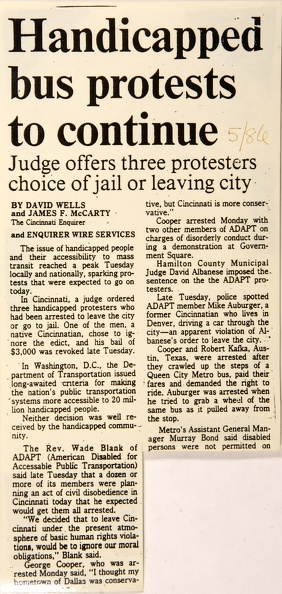 ADAPT (246)
ADAPT (246)
THE CINCINNATI ENQUIRER Wednesday, May 21, 1986 [This article continues in ADAPT 245, but the entire text is included here for easier reading.] [Headline] Handicapped bus protests to continue [Subheading] Judge offers three protesters choice of jail or leaving city BY DAVID WELLS and JAMES F. McCARTY The Cincinnati Enquirer and ENQUIRER WIRE SERVICES The issue of handicapped people and their accessibility to mass transit reached a peak Tuesday locally and nationally, sparking protests that were expected to go on today. In Cincinnati, a judge ordered three handicapped protesters who had been arrested to leave the city or go to jail. One of the men, a native Cincinnatian, chose to ignore the edict, and his bail of $3,000 was revoked late Tuesday. In Washington, D.C., the Department of Transportation issued long-awaited criteria for making the nation's public transportation systems more accessible to 20 million handicapped people. Neither decision was well received by the handicapped community. The Rev. Wade Blank of ADAPT (American Disabled for Accessible Public Transportation) said late Tuesday that a dozen or more of its members were planning an act of civil disobedience in Cincinnati today that he expected would get them all arrested. “We decided that to leave Cincinnati under the present atmosphere of basic human rights violations, would be to ignore our moral obligations," Blank said. George Cooper, who was arrested Monday said, “I thought my hometown of Dallas was conservative, but Cincinnati is more conservative." Cooper arrested Monday with two other members of ADAPT on charges of disorderly conduct during a demonstration at Government Square. Hamilton County Municipal Judge David Albanese imposed the sentence on the the ADAPT protesters. Late Tuesday, police spotted ADAPT member Mike Auburger, a former Cincinnatian who lives in Denver, driving a car through the -- city—an apparent violation of Albanese's order to leave the city. Cooper and Robert Kafka, Austin, Texas, were arrested after they crawled up the steps of a Queen City Metro bus, paid their fares and demanded the right to ride. Auburger was arrested when he tried to grab a wheel of the same bus as it pulled away from the stop. Metro's Assistant General Manager Murray Bond said disabled persons were not permitted on regular coaches because the company does not think it is safe. Metro provides wheelchair lifts on Special Access buses. but Bond said the cost of installing wheelchair lifts on regular buses would be prohibitive. Defense attorney Joanie Wilkens said after Tuesday’s hearing that she considered Albanese's order unusual but that ADAPT did not have the time or resources to fight it in court. ADAPT members were in Cincinnati to protest policies of Queen City Metro and the American Public Transit Association, which is having a convention at the Westin Hotel. In Washington, DOT's issuance of a final regulation requiring transit systems to provide reasonable alternative transportation for the handicapped contained no surprises. Many transit systems have been moving for several years toward providing alternatives such as van service or a taxi voucher system for handicapped passengers. But ADAPT and other national disability rights groups, dismayed by the new rule, almost immediately filed federal lawsuits against DOT to block the move. Handicapped representatives said the new rule fell far short of carrying out the law. A federal court in 1981 ruled that a federal requirement that all transit systems be accessible to the handicapped was too much of a financial burden. It told the Urban Mass Transportation Administration to develop new requirements that would assure that the handicapped are provided service. Under the final rule announced Tuesday, a transit authority must establish some alternative services for the handicapped if the regular bus or rail service can not be made accessible. Other members of ADAPT continued to picket in their wheelchairs in front of the Westin Hotel on Tuesday. The group suspended a wheelchair from a wooden cross. It symbolizes how the disabled are being crucified," said Bill Bolte, who helped to hoist the chair. PHOTO -- The Cincinnati Enquirer/Fred Strau: Two protesters hang a wheelchair on a large wooden cross. One man in a cowboy hat and plaid shirt (Joe Carle) steadies the cross and the chair from below, while a second man (Jim Parker) stands and pulls the manual wheelchair higher. Behind them several other protesters (including Joanne ____) watch and stand by extensive police barricades in front of the APTA convention hotel. Caption reads: Joe Carle, left, and Jim Parker chain a wheelchair to a cross Tuesday outside the Westin Hotel. The two were among several members of the American Disabled for Accessible Public Transit demonstrating against City Metro and the American Public Transit Association which is meeting at the Westin.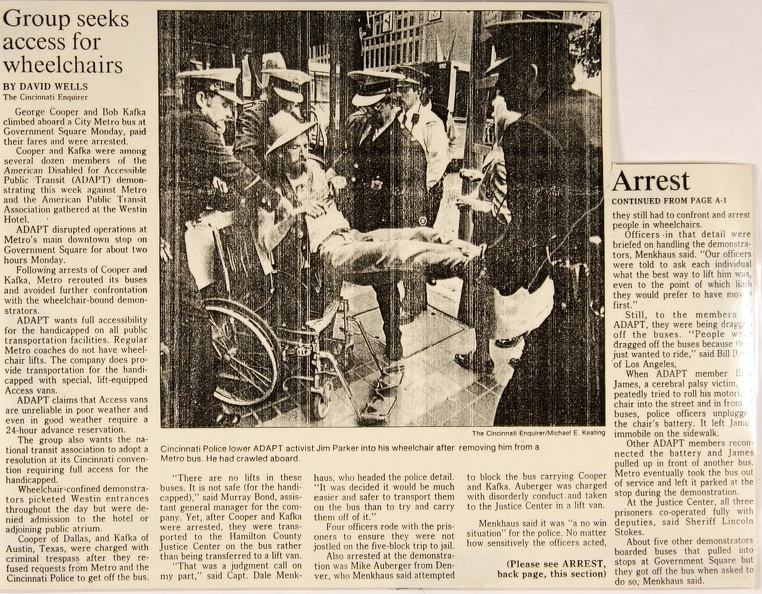 ADAPT (240)
ADAPT (240)
The Cincinnati Enquirer Photo by the Cincinnati Enquirer/Michael E. Keating: Four police officers holding a thin, tall man (Jim Parker)by his legs and arms suspending him in the air while they try to place him in the wheelchair. Another police officer and a passerby at the street corner are visible in background, as well as a city bus parked with its doors open. Caption: Cincinnati Police lower ADAPT activist Jim Parker into his wheelchair after removing him from a Metro bus. He had crawled aboard. [Headline] Group seeks access for wheelchairs By David Wells George Cooper and Bob Kafka climbed aboard a City Metro bus at Government Square Monday, paid their fares and were arrested. Cooper and Kafka were among several dozen members of the American Disabled for Accessible Public Transit (ADAPT) demonstrating this week against Metro and the American Public Transit Association gathered at the Westin Hotel. ADAPT disrupted operations at Metro’s main downtown stop on Government Square for about two hours Monday. Following arrests of Cooper and Kafka, Metro rerouted its buses and avoided further confrontation with the wheelchair-bound demonstrators. ADAPT wants full accessibility for the handicapped on all public transportation facilities. Regular Metro coaches do not have wheelchair lifts. The company does provide transportation for the handicapped with special, lift-equipped Access vans. ADAPT claims that Access vans are unreliable in poor weather and even in good weather require a 24-hour advance reservation. The group also wants the national transit association to adopt a resolution at its Cincinnati convention requiring full access for the handicapped. Wheelchair-confined demonstrators picketed Westin entrances throughout the day but were denied admission to the hotel or adjoining public atrium. Cooper of Dallas, and Kafka of Austin, Texas, were charged with criminal trespass after they refused requests from Metro and the Cincinnati Police to get off the bus. “There are no lifts in these buses. It is not safe (for the handicapped), “said Murray Bond, assistant general manager for the company. Yet, after Cooper and Kafka were arrested, they were transported to the Hamilton County Justice Center on the bus rather than being transferred to a lift van. “That was a judgement call on my part,” said Capt. Dale Menkhaus, who headed the police detail. “It was decided it would be much easier and safer to transport them on the bus than to try to carry them off of it.” Four officers rode with the prisoners to ensure they were not jostled on the five-block trip to jail. Also arrested at the demonstration was Mike Auberger from Denver, who Menkhaus said attempted to block the bus carrying Cooper and Kafka. Auberger was charged with disorderly conduct and taken to the Justice Center in a lift van. Menkhaus said it was “a no win situation” for the police. No matter how sensitively the officers acted, they still had to confront and arrest people in wheelchairs. Officers in that detail were briefed on handling the demonstrators. Menkhaus said. “Our officers were told to ask each individual what the best way to lift him was, even to the point of which limb they would prefer to have moved first.” Still, to the members ADAPT, they were being dragged off the buses. “People were being dragged off the buses because they just wanted to ride,” said Bill Bolte of Los Angeles. When ADAPT member Rick James, a cerebral palsy victim repeatedly tried to roll his motorized chair into the street and in front of buses, police officers unplugged the chair’s battery. It left James immobile on the sidewalk. Other ADAPT members reconnected the battery and James pulled up in front of another bus. Metro eventually took the bus out of service and left it parked at the stop during the demonstration. At the Justice Center, all three prisoners co-operated fully with deputies, said Sheriff Lincoln Stokes. About five other demonstrators boarded buses that pulled in the stops at Government Square but they got off the bus when asked to do so, Menkhaus said.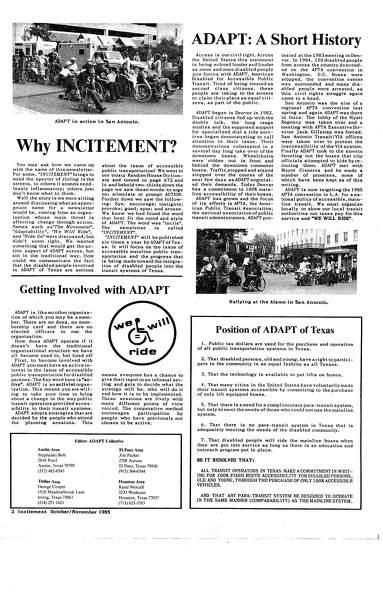 Incitement v.1 n.1 p.2
Incitement v.1 n.1 p.2
page 2 includes photo of ADAPT marching in San Antonio; Article: Short History of ADAPT; article: Why Incitement?; photo: ADAPT rally at the Alamo; article: Getting Involved with ADAPT; early We Will Ride logo; position statement of ADAPT of Texas; contact info for the editors of the ADAPT collective (Stephanie & Bob, Jim Parker; George Cooper; Rand Metcalf)